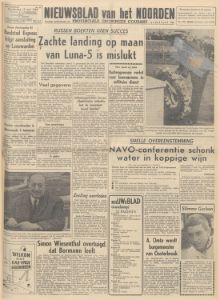About the day » Thursday May 13, 1965Calender converter
Born on Thursday May 13, 1965
- Ernest-Josias de Saxe-Cobourg-Gotha († 2009)
- Ronald Ronny Grandjean Perrenod Comtesse, Amersfoort († 2022)
- Maria Anna Sanders, Maarssen, Utrecht, Nederland
- Marjolein Hillegonda BOUMA, Emmen Drenthe Netherlands († 2004)
- Ernst-Josias VON SAXE-COBURG AND GOTHA, Landshut Bavaria Germany († 2009)
- Kendall Darrell Talley († 1998)
- Ernst-Josias Saxe-Coburg and Gotha († 2009)
- Catharina Everdina Kraaijeveld, 's-Gravenhage, Zuid-Holland, Nederland († 2012)
Died on Thursday May 13, 1965
- Arie Los (75), Leiden
- Aukje Bruinsma (61), Groningen
- August Jacob Kitzke (84)
- Adriana Bastiaanse (71), Roosendaal, Noord-Brabant, Nederland
- Bernardus Frederikus Koopman (75), Almelo, Overijssel, Nederland
- Adrianus Leonardus Maria Wiewel (79), Amsterdam-Noord-Holland-Nederland
- Albert Vriend (83), Avereest
- Adrianus Fredericus Van Dalen, Den Haag
- Atha Smith (44), Indianapolis, Marion, Indiana, Verenigde Staten
- Arendina Hendrika Gleis (82), Buurse, Haaksbergen, Overijssel, Netherlands
Source: Delpher (KB | national library) Newspapers from May 13, 1965 at Delpher
- Friese koerier : onafhankelijk dagblad voor Friesland en aangrenzende gebieden
- Amigoe di Curacao : weekblad voor de Curacaosche eilanden
- De waarheid
- Leeuwarder courant : hoofdblad van Friesland
- Nieuwsblad van het Noorden
- Het vrije volk : democratisch-socialistisch dagblad
- Limburgsch dagblad
- Gereformeerd gezinsblad / hoofdred. P. Jongeling
- De Tijd De Maasbode
- De Telegraaf
Born on May 13
- 1964 » Chris Maitland, English drummer
- 1964 » Stephen Colbert, American comedian and talk show host
- 1964 » Tom Verica, American actor, television director, and producer
- 1965 » Hikari Ōta, Japanese comedian and actor
- 1965 » János Marozsán, Hungarian footballer
- 1965 » José Antonio Delgado, Venezuelan mountaineer († 2006)
- 1965 » José Rijo, Dominican baseball player
- 1965 » Lari White, American singer-songwriter, producer, and actress († 2018)
- 1965 » Tasmin Little, English violinist and educator
- 1966 » Alison Goldfrapp, English singer-songwriter and producer
Died on May 13
- 1957 » Michael Fekete, Hungarian-Israeli mathematician and academic (b. 1886)
- 1961 » Gary Cooper, American actor (b. 1901)
- 1962 » Franz Kline, American painter and academic (b. 1910)
- 1962 » Henry Trendley Dean, American dentist (b. 1893)
- 1963 » Alois Hudal, Austrian-Italian bishop (b. 1885)
- 1972 » Dan Blocker, American actor (b. 1928)
- 1974 » Arthur J. Burks, American colonel and author (b. 1898)
- 1974 » Jaime Torres Bodet, Mexican poet and diplomat (b. 1902)
- 1975 » Bob Wills, American singer-songwriter and actor (b. 1905)
- 1977 » Mickey Spillane, American mobster (b. 1934)
Names that were popular for boys in 1965
Names that were popular for girls in 1965
Source: Wikipedia Historical events 1965
- Koningin Juliana (Huis van Oranje-Nassau) was from September 4, 1948 till April 30, 1980 sovereign of the Netherlands (also known as Koninkrijk der Nederlanden)
- In The Netherlands , there was from July 24, 1963 to April 14, 1965 the cabinet Marijnen, with Mr. V.G.M. Marijnen (KVP) as prime minister.
- In The Netherlands , there was from April 14, 1965 to November 22, 1966 the cabinet Cals, with Mr. J.M.L.Th. Cals (KVP) as prime minister.
- The Netherlands had about 12.2 million citizens.
- February 17 » Project Ranger: The Ranger 8 probe launches on its mission to photograph the Mare Tranquillitatis region of the Moon in preparation for the manned Apollo missions. Mare Tranquillitatis or the "Sea of Tranquility" would become the site chosen for the Apollo 11 lunar landing.
- February 20 » Ranger 8 crashes into the Moon after a successful mission of photographing possible landing sites for the Apollo program astronauts.
- March 6 » Premier Tom Playford of South Australia loses power after 27 years in office.
- September 6 » India retaliates following Pakistan's Operation Grand Slam which results in the Indo-Pakistani War of 1965 that ends in a stalemate followed by the signing of the Tashkent Declaration.
- November 27 » Vietnam War: The Pentagon tells U.S. President Lyndon B. Johnson that if planned operations are to succeed, the number of American troops in Vietnam has to be increased from 120,000 to 400,000.
- December 3 » The Beatles release highly successful and influential experimental folk album Rubber Soul.
Weather May 13, 1965
The temperature on May 13, 1965 was between 5.5 °C and 22.2 °C and averaged 14.4 °C. There was 13.3 hours of sunshine (85%). The partly clouded was. The average windspeed was 1 Bft (weak wind) and was prevailing from the ??.

 May 12, 1965
May 12, 1965